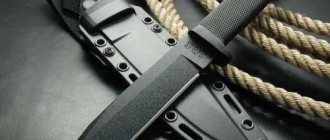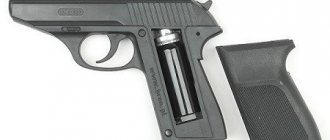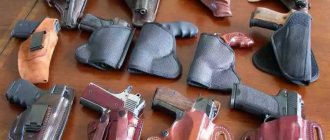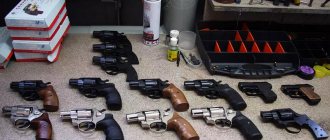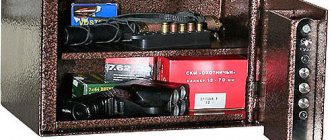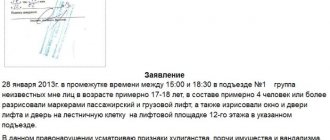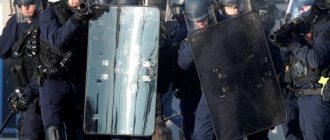Edged weapons are weapons that are used to hit a target using human muscle power through direct contact with the target. Such weapons can be piercing, slashing, piercing-cutting, crushing, and the like. Therefore, edged weapons include Finnish knives, daggers, knives, checkers, sabers, stilettos, brass knuckles, dirks and other objects that are specially adapted or directly intended to hit a living target.
Weapons are not products that are certified as products for industrial or household purposes. These are garden, shoe, kitchen, penknives and the like. You should know that there is responsibility for storing and carrying bladed weapons in 2021. This should be taken into account when purchasing metal products of a piercing or cutting nature. The issue of recognizing a certain object as a cold weapon is decided by forensic examination.
Distinctive features of edged weapons
Melee weapons have the following distinctive features:
- blade length is over 90 mm;
- blade thickness is over 2.4 mm;
- the angle of convergence of the butt and blade is no more than 70 degrees;
- the blade roll is no more than 9 mm;
- steel hardness is at least 25 Rockwell;
- the blade penetrates to a depth of at least 20 mm;
- there is a pronounced limiter for the fingers;
- the tip of the blade, which is convenient for stabbing in the presence of the other above point;
Edged weapons can be recognized as such only based on the results of certification or forensic examination. Punishment for carrying a bladed weapon may occur in the absence of a permit.
Summary
All actions with firearms are regulated by the legislation of the Russian Federation. In order to purchase it, you must obtain a special license and permission. After the transaction or during its process, record the fact of purchase in OLRR. If this is not done, the possession of weapons will be considered illegal. Secret hiding of illegal firearms and ammunition is also unacceptable.
Such acts will be subject to criminal prosecution. In the best case, the offender faces restriction of freedom for up to 3 years, in the worst case – imprisonment for up to 4 years. When illegal acts are committed by several people, the punishment will be much more severe.
If you find yourself in such a situation and don’t know what to do, contact our lawyers immediately. They will carefully review the specifics of your case and suggest ways to solve the problem. Their experience in participating in such proceedings will help reduce the penalty to a minimum.
Latest questions on the topic: “Is there a prison sentence for illegal possession of firearms?”
Illegal storage of ammunition, liability under the Criminal Code of the Russian Federation
I was detained with 5 rounds of 7.62 caliber, what do I face for this for illegal possession of ammunition?
The expert recognized the cartridges as live ammunition, but there was no license. Denis, Tomsk is now online
You will face criminal liability under Art. 222 of the Criminal Code of the Russian Federation Article 222. Illegal acquisition, transfer, sale, storage, transportation or carrying of weapons, their main parts, ammunition, explosives and explosive devices 1. Illegal acquisition, transfer, sale, storage, transportation or carrying of firearms, their main parts, ammunition (except for civilian smooth-bore long-barreled weapons, their main parts and cartridges for them, limited-kill firearms, their main parts and cartridges for them), explosives or explosive devices - punishable by restriction of freedom for a term of up to three years, or forced labor for a term of up to four years, or arrest for a term of up to six months, or imprisonment for a term of up to four years with a fine in the amount of up to eighty thousand rubles or in the amount of wages or other income of the convicted person for a period of up to three months, or without it. 2. The same acts committed by a group of persons by prior conspiracy are punishable by imprisonment for a term of two to six years. 3. Acts provided for in parts one or two of this article, committed by an organized group, are punishable by imprisonment for a term of five to eight years. 4. Illegal sale of civilian firearms smooth-bore long-barreled weapons, firearms of limited destruction, gas weapons, bladed weapons, including including throwing weapons, is punishable by compulsory labor for a term of up to four hundred eighty hours, or correctional labor for a term of one to two years, or restriction of freedom for a term of up to two years, or forced labor for a term of up to two years, or arrest for a term of up to two years. three to six months, or imprisonment for a term of up to two years with a fine in the amount of up to eighty thousand rubles or in the amount of wages or other income of the convicted person for a period of up to six months or without it. Note. A person who voluntarily surrenders the items specified in this article is exempt from criminal liability under this article. Their seizure during the detention of a person, as well as during investigative actions to detect and seize them, cannot be recognized as voluntary surrender of the items specified in this article, as well as in Article 223 of this Code. What can I advise you? If you do not deny your guilt, then now focus on collecting and providing mitigating circumstances listed in Art. 61 of the Criminal Code of the Russian Federation. Article 61 of the Criminal Code of the Russian Federation Circumstances mitigating punishment 1. Mitigating circumstances are recognized as: a) the commission of a crime of minor or moderate gravity for the first time due to a random combination of circumstances; b) the minority of the perpetrator; c) pregnancy; d) the presence of young children with the perpetrator; e) committing a crime due to a combination of difficult life circumstances or out of compassion; f) committing a crime as a result of physical or mental coercion or due to financial, official or other dependence; g) commission of a crime in violation of the conditions of legality of necessary defense, detention of the person who committed the crime, extreme necessity, justified risk, execution of an order or instruction; h) illegality or immorality of the behavior of the victim, which was the reason for the crime; i) confession, active assistance in solving and investigating a crime, exposing and prosecuting other accomplices in a crime, searching for property obtained as a result of a crime; j) provision of medical and other assistance to the victim immediately after the commission of a crime, voluntary compensation for property damage and moral harm caused as a result of the crime, other actions aimed at making amends for the harm caused to the victim. 2. When assigning a punishment, circumstances not provided for in part one of this article may be taken into account as mitigating circumstances. Best regards, Yaroslav Tsvetkov.
What is the responsibility for storing bladed weapons?
Good afternoon.
Tell me what is the responsibility for storing bladed weapons. And in what law can this be seen? Dmitry, Kazan is online now
Hello. Article 222 of the Criminal Code of the Russian Federation. Illegal acquisition, transfer, sale, storage, transportation or carrying of weapons, their main parts, ammunition 4. Illegal sale of civilian firearms smooth-bore long-barreled weapons, firearms of limited destruction, gas weapons, edged weapons, including throwing weapons - (as amended Federal Laws dated December 8, 2003 N 162-FZ, dated December 28, 2010 N 398-FZ) is punishable by compulsory labor for a term of up to four hundred eighty hours, or correctional labor for a term of one to two years, or restriction of liberty for a term of up to two years, or forced labor for a term of up to two years, or arrest for a term of three to six months, or imprisonment for a term of up to two years with a fine in the amount of up to eighty thousand rubles or in the amount of the wages or other income of the convicted person for a period of up to six months or without it. Tell me what is the responsibility for storing bladed weapons. Dmitry There is no criminal liability for possession. Federal Law on Weapons N 150-FZ Article 6. Restrictions established on the circulation of civilian and service weapons On the territory of the Russian Federation the following is prohibited: 6) carrying by citizens for the purpose of self-defense long-barreled firearms and bladed weapons, with the exception of cases of transportation or transportation
What bladed weapons are prohibited?
The article of the Criminal Code of the Russian Federation on the carrying of edged weapons prohibits the circulation as service weapons, including civilian weapons, of boomerangs, shurikens, brass knuckles, flails, as well as other objects specially adapted for use as weapons with throwing and impact-crushing action. In Russia, according to Article 6 of the weapons law, the circulation of the following weapons as service weapons, including civilian weapons, is prohibited:
- knives and bladed weapons, blades and blades have a length of more than 90 mm:
- are removed from the handle automatically by pressing a button or a special lever, and are also fixed by them;
- are extended using accelerated movement or gravity, and are also locked automatically.
Article for illegal storage, carrying and transportation of firearms in the Criminal Code of the Russian Federation
Punishments for illegal actions are established in Art. 222 of the Criminal Code of the Russian Federation. It does not include: civilian long-barreled, smooth-bore and limited-destruction weapons. The extent of responsibility for a crime depends on the circumstances, as well as:
- type of weapon. Illegal possession of military models by a civilian is considered a more serious offense than concealment of a hunting carbine or sporting rifle. The design of the barrel also plays a role. Rifled weapons are more dangerous than smooth-bore weapons because they have a longer sighting range;
- number of weapons. The presence of an entire arsenal indicates a deliberate and planned crime;
- involvement of weapons in previously committed crimes. If illegal actions were carried out with its help, then it was clearly acquired illegally.
For illegal storage, carrying and transportation of traumatic weapons, the violator will bear administrative liability. Criminal prosecution is possible if such a device was used to cause harm to health or commit murder.
What bladed weapons are citizens entitled to have?
The rules for carrying edged weapons require a license for it.
- Citizens who have permission to carry, including storage of hunting firearms, have the right to purchase hunting bladed weapons. When purchasing this weapon, the seller notes the entry in the citizen’s hunting license. In this case, a permit to carry this bladed weapon will be a permit to carry a hunting weapon.
- Some citizens can also buy bladed weapons, which are used to wear with the national costumes of the peoples of Russia, as well as Cossack uniforms. These are daggers, knives, checkers and sabers. The Russian government determines the attributes of national costumes.
In other cases, carrying edged weapons is prohibited.
What is the sentence for illegal possession of weapons and ammunition?
For such actions, the Criminal Code of the Russian Federation provides the following penalties:
- When a crime is committed by one person, he faces restriction of freedom for up to 3 years, forced labor for 4 years, or arrest for 6 months. In the most serious cases, the accused can be imprisoned for up to 4 years. At the same time, the convicted person may be required to pay a fine of 80 thousand rubles. or in the amount of his income for a period of up to 3 months;
- If the offense is committed by several persons by prior agreement, then each of the group members will be imprisoned for a period of 2 to 6 years. Also, for illegal possession of firearms, you may be required to pay a fine for illegal storage of firearms in the amount of 100 thousand rubles. or in the amount of earnings for a period of up to 6 months.
- Illegal possession of firearms and ammunition by an organized group entails a penalty for each member in the form of imprisonment for a term of 5 to 8 years. At the same time, a fine of 100 to 200 thousand rubles may be awarded. or in the amount earned for 1 year.
Note!
You can avoid punishment by handing over your weapons to the territorial body of the National Guard of the Russian Federation. Surrender will not be voluntary when a dangerous item was discovered by law enforcement officers during a search or inspection.
Checking control services
Let’s assume a situation where a person carrying this type of weapon is intoxicated.
The punishment for illegally carrying weapons will be:
- if a law enforcement officer refused to undergo a medical examination procedure;
- If the person refuses, he will be charged with violating the rules of carrying weapons.
The liability will be deprivation of the right to purchase for 12 to 24 months. Accordingly, the person will be deprived of both a license and means of self-defense.
But there are routine checks by police officers of persons who own traumatic weapons. The main goal of this type of inspection is to control the storage method.
When visiting a residential building in which a licensee resides while he or she is away from the premises, officers will ask to present the weapon to verify license plates. Moreover, if family members resort to such a trick, the licensee will lose the weapon with the wording “failure to comply with storage conditions.”
No one other than the person who received the permit can know where the key to the safe or the code for opening the safe is located, otherwise the inspection by the control services will be accompanied by confiscation.
Who was left without a license
The question of what the storage of traumatic weapons without a license can lead to does not have a clear answer. The fact is that responsibility for the lack of a permit largely depends on the actions of the citizen himself, as well as on the circumstances that led to the illegal trafficking of weapons. We will try to simulate several life situations in order to subsequently determine which article of the criminal or administrative code is applicable in each specific case.
- The first case implies that the traumatic pistol was purchased legally, and the buyer presented permission to purchase the traumatic pistol. In addition, the weapon is registered, and the citizen is its official owner. By coincidence, he did not manage to renew his license on time. This means that from the moment it ends, the possession and, especially, the use of weapons is illegal.
- Let’s imagine that a citizen with an expired license did not apply for it for fear of being punished. Gradually the period of delay will increase. Finally, it will begin to be calculated not in days or months, but in years. Judicial practice shows that the consequences will depend on the length of delay, as the judge assesses the citizen’s desire or unwillingness to return to the law.
- The owner of the weapon followed the legitimate path, he collected all the documents and received permission to purchase the weapon, but after the acquisition he did not register the barrel and was left without a license. This is a more serious violation, which indicates a deliberate disregard for the provisions of the law. You won't be able to stay in the shadows for long. Even if you are not caught red-handed by a law enforcement representative, “good-natured” neighbors or “faithful” friends can make an information call to the police.
- If you don't have permission, they won't talk to you (not literally) in any gun store. The only way to purchase weapons is the black market, which, unfortunately, is still thriving in our country. Naturally, there can be no question of any legality, and since no documents confirm the nature of the transaction, the citizen may be charged not with the purchase, but with the sale, which is already fraught with a criminal case.
If you look at the questions asked by visitors to weapons forums, and take only topics related to the illegal carrying of traumatic weapons, then at first glance it may seem that each has its own objective reason, so such situations should be simulated several times more. But in fact, we have described the main components of violations of the law, and the details and details of their manifestation are no longer so significant.
Why do you need a permit?
In order for a citizen to properly store a smooth-bore weapon, as well as use it legally, he needs a license. Without this document, it is not possible to purchase the necessary gun and ammunition. Responsibility for carrying without permission and documents provides not only an administrative fine, but also deprivation of the opportunity to obtain a permit for several years.
In order not to break the law and obtain a license, you must:
- First, decide on the brand and draw up an application for the licensing and permitting department.
- Prepare all documents.
The application must be accompanied by:
- A certificate stating that the applicant has completed a training course on weapons storage and successfully passed the exam.
- Conclusion that a person’s knowledge of the safe handling of a shotgun was tested.
- Medical certificate.
- Photos.
- Hunting license (if a hunting rifle is purchased).
- On the right about paying the state duty.
In order to receive a certificate of passing the exams, you must complete a training course at a special training center. The duration of training is 3–4 months. As for the medical report, the future gun owner needs to undergo such specialists as a psychiatrist, narcologist, ophthalmologist, etc.
Important! Only one weapon can be purchased per license. One person can receive a total of 5 licenses at a time
The citizen’s application is considered within 10 days, after which he is sent a notification with a decision. The license is valid for six months. During this time, a civilian can purchase the desired weapon. But the design doesn't end there.
Next, you need to contact the LRO again (2 weeks after purchase are given for this) and exchange the license for a permit. The storage conditions of the gun will be checked, after which the person will be issued a permit. It is valid for 5 years, and after this period it can be extended.
A license may be refused for the following reasons:
- age (less than 18 years);
- incorrectly completed application;
- absence of any document;
- a conviction for an intentional crime or a large number of administrative offenses;
- lack of permanent residence;
- refusal to take training courses.
If a license has been refused, under no circumstances should you purchase a weapon illegally. Such a violation may result in administrative or criminal penalties.
https://youtube.com/watch?v=BYrq6BuO2gk%3Ffeature%3Doembed
What is this
There is no legal concept of “traumatic weapon” in the Russian legal framework.
The conceptual apparatus of the Federal Law “On Weapons” contains a definition of firearms of limited destruction and classifies them as:
- short-barreled;
- trunkless.
The purpose of application is to hit a living creature mechanically without causing death. Method of application - throwing a cartridge case with a traumatic effect, which may have a powder or other charge.
Specifications must meet the following criteria:
- the charge cannot exceed ten rounds;
- the energy output at the moment of firing from the muzzle of a pistol, revolver and other type of tram cannot exceed 91 Joule;
- country of origin: Russia.
Since this means of self-defense does not have a lethal effect, it is considered one of the types of civilian weapons.
Administrative responsibility
Administrative liability occurs in the event of gross violations by the owner of the weapon. They may consist in the lack of appropriate permission or violation of transportation and storage rules. The amounts of fines are specified in the Administrative Code.
The rules for the circulation of bladed weapons themselves are formulated in the Federal Law. The procedure for the destruction or recording of certain species is also established there. Depending on the type of violation, an administrative fine may be imposed in an amount that varies from 500 rubles to 2000 rubles. In addition, administrative punishment means deprivation of a license or deprivation of the opportunity to obtain one. The duration of such sanctions can be up to 12 months.

